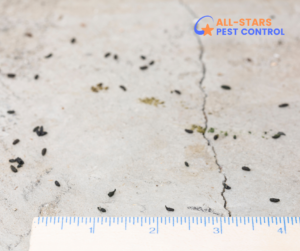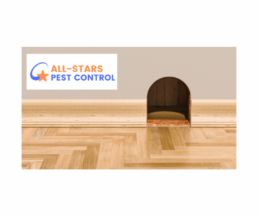How Pests Can Impact Your Health & Home Hygiene
Pests may seem like a minor annoyance, but they pose significant risks to both your health and home hygiene. Whether it’s rodents, cockroaches, termites, or bed bugs, these unwelcome guests can introduce diseases, trigger allergies, and cause structural damage to your home. At All-Stars Pest Control, serving Mechanicsville, Virginia, and surrounding areas, we believe in keeping your home safe and healthy by educating homeowners on the dangers pests bring and how to prevent them.
Health Risks of Pests
Pests carry bacteria, viruses, and allergens that can have serious consequences for your health. Here are some of the most common ways pests can impact your well-being:
 1. Disease Transmission
1. Disease Transmission
- Rodents like rats and mice spread diseases such as leptospirosis, hantavirus, and salmonella through their urine, droppings, and bites.
- Cockroaches are known carriers of E. coli and Salmonella, which can contaminate food and cause food poisoning.
- Mosquitoes are notorious for spreading malaria, dengue fever, and the Zika virus.
 2. Allergy & Asthma Triggers
2. Allergy & Asthma Triggers
- Cockroach droppings, shed skin, and saliva can worsen asthma symptoms, particularly in children and sensitive individuals.
- Dust mites thrive in bedding and upholstery, contributing to allergies and respiratory problems.
- Rodents shed dander, which can trigger allergic reactions.
 3. Bites and Stings
3. Bites and Stings
- Bed bugs bite and leave itchy, red welts that can become infected if scratched excessively.
- Bees and wasps can cause painful stings, leading to severe allergic reactions in some people.
- Fleas and ticks not only irritate pets but can also bite humans, transmitting Lyme disease and other infections.
 Home Hygiene & Structural Damage
Home Hygiene & Structural Damage
Pests don’t just pose health risks—they also compromise your home’s cleanliness and integrity.
1. Food Contamination
Pests like ants, cockroaches, and rodents search for food sources, contaminating your kitchen with bacteria and feces. Once they access food storage, they can quickly ruin your supplies.
2. Property Damage
- Termites silently destroy wooden structures, causing thousands of dollars in damage before homeowners even notice.
- Rodents chew through wires, insulation, and furniture, increasing fire risks and leading to costly repairs.
- Carpet beetles feed on fabric and upholstery, ruining household items.
 How to Protect Your Home
How to Protect Your Home
The best way to prevent pest problems is through proactive pest control and good home hygiene practices. Here are some effective steps:
- Keep your home clean – Regularly vacuum, mop floors, and wipe down surfaces to remove food crumbs and attractants.
- Seal entry points – Close off gaps in windows, doors, and walls to prevent pests from entering.
- Store food properly – Use airtight containers and avoid leaving food out overnight.
- Eliminate standing water – Mosquitoes breed in stagnant water, so remove any excess water in and around your home.
- Schedule regular pest inspections – Professional pest control services can identify and address infestations before they become severe.
Why Choose All-Stars Pest Control in Mechanicsville, VA
At All-Stars Pest Control, we specialize in comprehensive pest management solutions to protect your home and family. Our local Mechanicsville, Virginia pest control experts use state-of-the-art techniques to ensure effective and safe treatments. With years of experience in residential and commercial pest control, we are dedicated to keeping our community pest-free.
Our Services Include:
✅ Residential & Commercial Pest Control
✅ Termite Inspection & Treatment
✅ Mosquito & Tick Control
✅ Rodent Exclusion & Removal
✅ Bed Bug Treatment & Prevention
Don’t wait until pests take over—contact All-Stars Pest Control today for a free inspection and keep your home pest-free! Call us at 804-306-1052 or visit www.allstarspest.com to schedule an appointment.
For more expert tips and professional pest control services, trust Mechanicsville’s top-rated pest control company—All-Stars Pest Control!
Why Mice Overwinter and How to Prevent Them From Invading Your Home In Mechanicsville Virginia
Why Do Mice Overwinter?
 Mice are not built to survive extreme cold, and as the temperatures drop, they seek warmer environments to survive. Homes and businesses become prime locations due to several factors:
Mice are not built to survive extreme cold, and as the temperatures drop, they seek warmer environments to survive. Homes and businesses become prime locations due to several factors:
- Warmth: Mice cannot survive prolonged exposure to freezing temperatures. They instinctively seek warm spaces like homes, basements, garages, and sheds.
- Food Sources: During the winter, natural food supplies are scarce. Your home can provide easy access to food in pantries, kitchens, or even pet food left out.
- Shelter from Predators: Overwintering in human dwellings provides mice protection from predators such as cats, birds of prey, and larger mammals.
- Breeding Opportunities: Mice breed throughout the year, and indoor shelter allows them to continue reproducing even in winter, leading to rapid infestations.
How Mice Get Inside Your Home
 In Mechanicsville Virginia, Mice are extremely resourceful and can enter homes through the smallest of openings. Here are some common ways mice make their way indoors:
In Mechanicsville Virginia, Mice are extremely resourceful and can enter homes through the smallest of openings. Here are some common ways mice make their way indoors:
- Tiny Cracks and Gaps: Mice can squeeze through holes as small as 1/4 inch (about the size of a pencil). This includes cracks in foundations, gaps under doors, or spaces around windows.
- Utility Lines: Gaps around pipes, cables, or wiring that enter your home provide easy access points for mice.
- Openings in Attics and Basements: Poorly sealed attics, crawl spaces, and basements are particularly vulnerable as they provide shelter with minimal human traffic.
- Climbing and Jumping: Mice are excellent climbers and can access your home from rooflines, trees, or climbing along utility wires.
Signs of Mice Infestation in Winter
 Since mice tend to be nocturnal and prefer to hide, it’s important to know what signs to look out for during the colder months:
Since mice tend to be nocturnal and prefer to hide, it’s important to know what signs to look out for during the colder months:
- Droppings: Small, dark, rice-shaped droppings in cupboards, under sinks, or along walls.
- Gnaw Marks: Mice chew on almost anything to keep their teeth sharp. Look for chew marks on wood, wiring, or packaging.
- Noises: Scratching, scurrying, or squeaking sounds at night, especially in walls, ceilings, or attics.
- Nests: Mice build nests out of shredded paper, fabric, or insulation. Finding these in hidden areas indicates an infestation.
How to Prevent Mice from Overwintering in Your Home
Taking proactive steps to prevent mice from entering your home can save you from the hassle and expense of an infestation:
- Seal Entry Points: Regularly inspect your home’s exterior and seal any cracks, gaps, or holes that mice could enter through. Use materials like steel wool, caulk, or metal mesh that mice can’t easily chew through.
- Store Food Properly: Keep food in airtight containers and clean up any crumbs or spills promptly. Don’t forget to store pet food securely, as it can attract mice.
- Declutter Storage Areas: Mice love cluttered, undisturbed areas. Clean and organize your attic, basement, or garage, and store items in sealed plastic containers.
- Maintain Landscaping: Trim trees and bushes away from your home and clear leaves or debris that could provide shelter. This reduces the number of places where mice can hide near your home.
- Install Door Sweeps and Weather Stripping: Ensure that doors and windows are properly sealed, and install sweeps to close off gaps under doors.
- Use Traps and Deterrents: Place mouse traps in areas where mice are likely to enter, such as basements or attics. Ultrasonic devices and peppermint oil can also serve as natural deterrents.
When to Call a Professional Pest Control Service
Despite your best efforts, mice can still find their way into your home. If you notice persistent signs of a mouse infestation, it’s time to call a professional pest control service. Experts can identify problem areas, remove the infestation, and provide long-term solutions to prevent future invasions.
Conclusion
Mice overwinter in homes because they need warmth, food, and shelter. By understanding how they enter and what attracts them, you can take preventative measures to keep them out. Don’t let mice make your home theirs this winter—act now to protect your space from these unwelcome guests.


